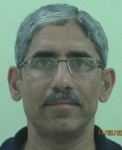Interview with Hornby School Tutor Dr. Amol Padwad
Amol Padwad, who took over the presidentship of ELTAI in July, 2010, holds a master’s degrees in English and Russian. He has other degrees to hiscredit like M.Phil (English), LL.B and PGDTE (CIEFL). He also did M.Ed. (TESOL) from University of Leeds, UK on the Hornby Trust scholarship. Currently the head of thePostgraduate Department of English at J. M. Patel College, Bhandara (Maharashtra), he was a moderator of ELTeCS- India (the regional electronic network of ELT professionals, promoted by the British Council) for a number of years.
He has completed one and is working on three ELT projects, funded by the British Council and the Hornby Trust. He is associated with numerous professional and social bodies, and has published several articles and translations. Here’s an interview with him done by Ushakiran Wagle.
What was the main focus of the Hornby School in Nepal?
The focus of the Hornby School in Nepal was ‘learning in low-resource classrooms’. This one-week residential school was a follow-up on a similar school last year. The main objective was to enable teachers to deal with the problem of lack of resources in their classrooms. The approach of the school was not ‘experts bringing academic knowledge and readymade solutions’, but the participants sharing their rich and varied experience, their ideas and practices and helping each other finding ways of addressing the problem.
How was your experience of delivering the sessions at the School?
It was an immensely enjoyable and enriching experience. The group had in it a range of countries (Nepal, India, Pakistan, Bangladesh), school contexts (urban/ rural, private/ state, primary to tertiary) and participant profiles (novices/ veterans, male/ female, various qualifications). There was a lot to learn from and share with each other. The sessions were all participatory and collaborative, and participants contributed actively and seriously to each session. The tutors Richard Smith and Jovan Ilic also brought in their rich experience, varied perspectives and ideas from other contexts.
Did the focus for the school and the local context here in Nepal match? If not, how did you respond?
The focus of the school had a great relevance to the local context in Nepal, I believe. As I understand, shortage of resources is a perennial problem in most Nepalese schools. Most schools have what we would term ‘low-resource classrooms’. So the proceedings of the Hornby School, we hope, were very useful to the Nepalese participants, who must have carried home several ideas and insights from the School to be tried out in their classrooms.
What is your opinion on the global trends and local context difference? How can we as ELT professional balance?
Especially in the case of ELT, we (meaning the countries in SAARC region) show a general tendency of blindly following whatever latest trends and techniques that come to us from the West. Global trends, which for us normally mean Western (especially UK-USA) trends, are either completely and uncritically accepted, or completely and equally uncritically rejected. Take, for example, communicative language teaching, to which we have shown one of these two extreme reactions. What we need is not to accept/ reject the whole package, but unpack it and see what has relevance for us and needs to be discarded. I personally believe that the ‘original’ Western model of CLT is not feasible/ relevant in our countries, but also that there are some really great insights and ideas which we may ignore to our peril. As ELT professionals, we might ask of every new development the ‘WIIFM’ question – ‘what’s in it for me?’
What is your final message to the readers?
My final message to the readers (who are all teachers, I guess) is – a teacher can and does make a world of difference to every classroom, whether we like it or not. But it’s in our hands to try to make a planned, thoughtful and positive difference to our learners and classrooms. The first step of making this positive change is to start changing ourselves.
Thank you, Dr. Padwad.

First of all i would like to thank to Ush kiran wagle who initiated to project questions by relating with ELT Trends and situation in Nepal.Really the questions are vible and authentic that focused on developing and creating new strategies and policy to make standard of ELT in real practice.I would appreciate the vision and logic addressing by ELT and its development,delivered by our intellectual person Amol Padwa whose logic and respons attempting to meet need and necessities rising in current situation in teaching and learning process.Thanks a lot both of ELT instructors and expert.
When it comes to igniting a passion for learning, it’s hard to hold a candle to Esperanto.